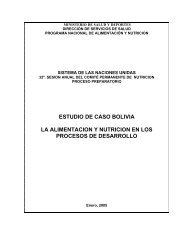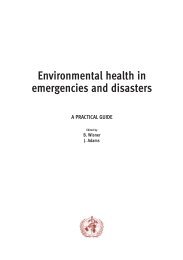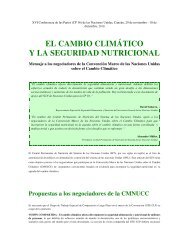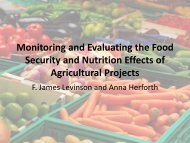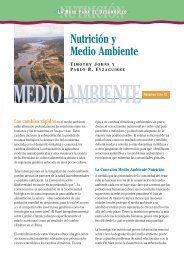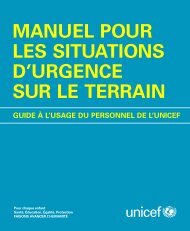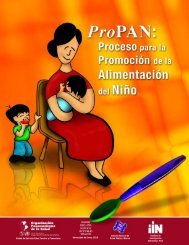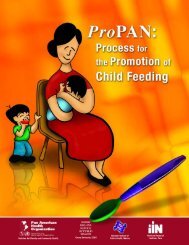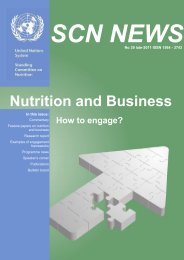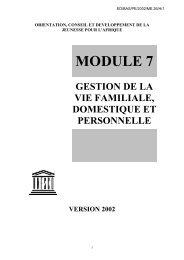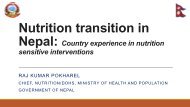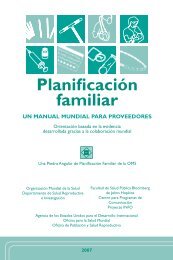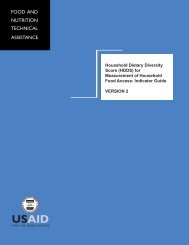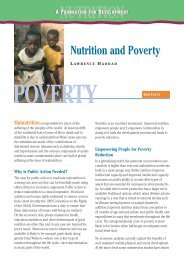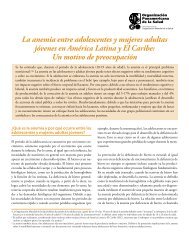SCN News No 36 - UNSCN
SCN News No 36 - UNSCN
SCN News No 36 - UNSCN
You also want an ePaper? Increase the reach of your titles
YUMPU automatically turns print PDFs into web optimized ePapers that Google loves.
www.unsystem.org/scn FEATURES 11<br />
hunger. Among those, 170 million are children under 5 years old. More than 500,000 women around the<br />
world still die each year due to complications during pregnancy and delivery that could be easily avoided or<br />
treated. And half of the population in the developing world still doesn’t have access to basic sanitation.<br />
President Lula has given priority to a development model with income redistribution and social inclusion and<br />
has committed his administration to a solidarity effort towards the reduction of hunger and malnutrition in the<br />
world. We consider this to be a challenge to be overcome by the entirety of humankind, and it will only be<br />
possible with cooperation and commitment from governments, multilateral organisms and actors in<br />
international civil society.<br />
In that sense, we have maintained an intense cooperation with international organisms and governments of<br />
other countries, giving and receiving technical cooperation. There is still a lot to learn, but we have already<br />
gathered various experiences that we consider to be worthy of being shared with our partner nations. We are<br />
continuously working in cooperative projects with multilateral organisms, and with development organs of the<br />
governments of Latin American and African countries as well as in other regions.<br />
The conclusions and propositions from the 35 th Session of the UN Standing Committee on Nutrition have a<br />
key role, because they help to define strategies for large-scale implementation of necessary interventions<br />
designed to reduce maternal and child malnutrition. In doing this, important steps are taken towards a more<br />
equitable and fraternal world, gathered around the promotion of the highest human values.<br />
Contact: ministro.mds@mds.gov.br<br />
References<br />
Brasil. Presidência da República (2007) Objetivos de Desenvolvimento do Milênio. Relatório Nacional de<br />
Acompanhamento. Brasília.<br />
Macinko J, Guanais FC, Souza MFM (2006) Evaluation of the impact of the Family Health Program on infant mortality in<br />
Brazil, 1990-2002. J Epidemiol Community Health 60:13-9.<br />
Maternal and Child Undernutrition Study Group (2008) Maternal and child undernutrition. The Lancet 371(9608-12). (online)<br />
Neri, MC (2007) Miséria, Desigualdade e Políticas de Renda: O Real do Lula. FGV/IBRE, CPS:Rio de Janeiro.<br />
SAGI/MDS (2007) Avaliação de Políticas e Programas do MDS – Resultados. Volume 1 – Segurança Alimentar e<br />
Nutricional. Brasília.<br />
UNDP (2007) Human Development Report 2007/2008. Fighting climate change: Human solidarity in a divided world.<br />
United Nations Development Programme:New Yoork. (online) [PNUD (2007) Relatório de Desenvolvimento Humano<br />
2007-2008. Combater a mudança do clima: solidariedade humana em um mundo dividido. Programa das Nações<br />
Unidas para o Desenvolvimento. PNUD:<strong>No</strong>va York (online)]<br />
Santos L, Paes-Sousa R, Soares M, Henrique F, Pereira L, Batista Fiho M, Martins M, Alcântara L, Monteiro C, Conde W<br />
and Konno S (2007) Perfil nutricional de crianças menores de cinco anos no semi-árido brasileiro. In Vaitsman J and<br />
Paes-Sousa R (eds.) Avaliação de políticas e programas do MDS – resultados. Volume I Segurança Alimentar e<br />
Nutricional. SAGI/MDS:Brasília.<br />
Silva M, Assis A, Santana M, Pinheiro S, Santos N and Brito E (2007) Programa Bolsa Família e segurança alimentar<br />
das famílias beneficiárias: resultaos para o Brasil e regiões. In Vaitsman J and Paes-Sousa R (eds.) Avaliação de<br />
políticas e programas do MDS – resultados. Volume II Bolsa Família e Assistência Social. SAGI/MDS:Brasília.<br />
UNICEF (2008) Situação Mundial da Infância 2008 – Caderno Brasil. (online)<br />
TRAINING ANNOUNCEMENT:<br />
BPNI Certificate Course on “Infant and Young Child Feeding Counseling Specialist"<br />
BPNI/IBFAN Asia is organizing certificate training Courses on Infant and Young Child Feeding Counseling: A Training Course – The<br />
3 in 1 Course (An Integrated Course on Breastfeeding, Complementary Feeding and Infant Feeding & HIV-Counseling). Interest<br />
and commitment: Protecting, promoting and supporting breastfeeding and complementary feeding. Help for solving mother's problems.<br />
Who can do it: Doctors, Staff nurses, Graduates in nutrition, science, dietetics, home science, social work etc. Duration of<br />
training: 7 days (51 Hours) including 5 X 2 hrs clinical practice in hospital. Competence after receiving training: Participants will be<br />
able to provide individual counselling on breastfeeding, complementary feeding HIV and Infant Feeding Initiate setting up a infant<br />
and young child feeding counseling center Provide referral level support. Training: 4 National Trainers will train 24 infant and young<br />
child feeding counseling specialists in one training session. Course Fees: Rs. 5,000/- (includes training materials, lunch and tea).<br />
Training Venue and Date: Ranchi, Jharkhand from 26 September - 2 October 2008. For more information please visit www.bpni.org<br />
back to contents <strong>SCN</strong> NEWS # <strong>36</strong>



